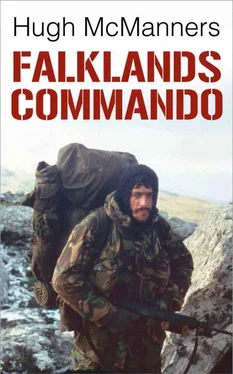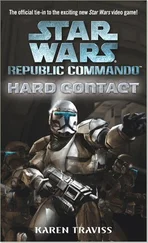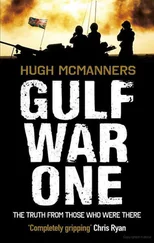Hugh McManners - Falklands Commando
Здесь есть возможность читать онлайн «Hugh McManners - Falklands Commando» весь текст электронной книги совершенно бесплатно (целиком полную версию без сокращений). В некоторых случаях можно слушать аудио, скачать через торрент в формате fb2 и присутствует краткое содержание. Город: London, Год выпуска: 2014, ISBN: 2014, Издательство: Nightstrike Publishing, Жанр: nonf_military, Биографии и Мемуары, на английском языке. Описание произведения, (предисловие) а так же отзывы посетителей доступны на портале библиотеки ЛибКат.
- Название:Falklands Commando
- Автор:
- Издательство:Nightstrike Publishing
- Жанр:
- Год:2014
- Город:London
- ISBN:978-0-992-81540-0
- Рейтинг книги:4 / 5. Голосов: 1
-
Избранное:Добавить в избранное
- Отзывы:
-
Ваша оценка:
- 80
- 1
- 2
- 3
- 4
- 5
Falklands Commando: краткое содержание, описание и аннотация
Предлагаем к чтению аннотацию, описание, краткое содержание или предисловие (зависит от того, что написал сам автор книги «Falklands Commando»). Если вы не нашли необходимую информацию о книге — напишите в комментариях, мы постараемся отыскать её.
Falklands Commando — читать онлайн бесплатно полную книгу (весь текст) целиком
Ниже представлен текст книги, разбитый по страницам. Система сохранения места последней прочитанной страницы, позволяет с удобством читать онлайн бесплатно книгу «Falklands Commando», без необходимости каждый раз заново искать на чём Вы остановились. Поставьте закладку, и сможете в любой момент перейти на страницу, на которой закончили чтение.
Интервал:
Закладка:
The long journey ahead, our poor living conditions and the boredom that would eventually strike everyone, led to the invention of a plethora of activities. Daily exercise started once the storms and seasickness abated. Weapon drills and map preparation, first aid, and lectures on all imaginable subjects were programmed, and serious training began.
The padre of 45 Commando, the Rev Wynne Jones, decided he would undertake the single-handed production of a ship’s newspaper, taking the view that this was one of a padre’s ‘Duties in Action’. He called it the Oily Rag , a reference to the many similarities between Sir Percivale and tramp steamers, whose grimy engineers had coaxed them around the world. Our ship’s engineer wasn’t too pleased, but it seemed appropriate to us.
The padre’s editorial style was refreshingly distinct. He published everything that people were kind enough to submit to him without any alteration or amendment, even retaining the spelling of the original to add to the flavour. His only changes were inadvertent typos or errors from deciphering poorly written manuscripts. He’d start with news from the daily teleprinted compilation and summaries of UK newspapers transmitted from London. The rest was an open forum for anything at all. I became a regular contributor with an anonymous column ‘Don’t Get Pissed Off… But’ which took shipboard events and exaggerated them. My pen name ‘Mack’ was swiftly rumbled once the level of the humour had been assessed.
We were avid for news, and as not everyone was able to listen to the radio, the padre’s bulletins were very useful. We were most concerned with the latest moves in Anglo-Argentinian diplomatic relations, and the Parliamentary debates about the crisis. We were participants, along with the two Super Powers, our EEC allies and the whole complex South American imbroglio. Something had to be done, we were part of the manoeuvrings, and some of us might be about to die for it.
In the Oily Rag dated 10 April 1982, Wynne reported UK defence secretary Nott as saying that the Royal Navy would sink Argentine naval ships in the exclusion zone after a deadline this coming Monday. When told of this, President Galtieri threatened to respond with war. Nott had said, “Let them come out”. Meanwhile, the US Secretary of State, Al Haig was in Buenos Aires, greeted by a mass rally in support of the Malvinas invasion. (On 12 April the Rag was to report Mr Haig as having shuttled to London.) There were reports of the Argentinians laying mines round the Falklands and installing sophisticated surveillance systems there; of the fifteen civil servants on the islands asking for the evacuation of the civilians before the Task Force arrived, which the deposed Governor countered by saying that 90% of the islanders would not leave.
But it looked as though there’d be no settlement – rather long delays, during which conditions at sea would sap our capacity to fight, the southern hemisphere winter would set in, and the Argentinians would have time to strengthen their defences.
Lesser items of news recorded the tribulations of people other than ourselves: 500 Mexicans in danger from a volcano, eight killed in a volcanic eruption in Indonesia, and three guerrillas to be executed in South Africa. On previous 10ths of April, there had been three naval victories: a French ship captured in 1795, the Second Destroyer Flotilla winning the first battle of Narvik in 1940 (Captain Warburton being awarded the VC), and a German U-Boat sunk in 1945.
The ‘Useful Information of the Day’ was the ‘vital statistics’ of HMS Fearless: laid down in 1962 (twenty years ago, which seemed a long time), the number of tons of water it displaced, and the numbers of landing craft, trucks and tanks it carried. There were also one or two notices which were not always what they seemed. The naïve volunteers of 10 April who reported to the ‘Mombassa Rest and Recreation Centre’ run by Staff Sergeant Smith ended up painting vehicle trailers.
The rest of the Oily Rag was given over to free-enterprise journalism, without censorship. To be a regular columnist in the Rag , it was important to write in the vernacular. As each issue was read, we developed an across-the-board pride that our ship had of certainty risen into the international class so far as coarse humour was concerned. As a solemn announcement in the Rag stated:
“The editors of Playboy and Knave wish to announce that next month’s issue will consist of cartoons and photographs only. This is because the dirty bastards that write all the letters and articles are on board this ship.”
My ‘Don’t Get Pissed Off… But’ column offered readers accounts of life on various other ships throughout the Fleet, detailing luxuries unknown on ours, or inventing peculiar naval customs and ceremonies that we simple soldiers ought to learn about. My alternative storyline was a comic-opera hierarchy of Argentine military characters, chronicling their imagined rise and fall as fearful news of the approaching Task Force reached them. What can you say about the enemy? It was psychologically better for us – and more civilised, not to portray them as odious. There was very little hatred in the Task Force.
In the 10 April issue, I described life on the Canberra , the luxury passenger liner bringing down a combination of Royal Marines, Army commandos, and Parachute Regiment. I wrote of ‘Phyllis and Desmond’ giving ballroom dancing lessons every morning, and growing rivalries among the embarked personnel because the female dance troupe ‘Pans People’ had been left on board by accident amid the confusion of their sailing, and how I’d offered to put them up on Sir Percivale to stop the ensuing quarrels.
In the next issue I was able to give more details: how there’d been a collapse of morale on the luxury liner because of too many compulsory cocktail parades, and how an escape committee was building a glider in the main ladies lavatory using seat planking from the lifeboats, with all members of 3 Para donating their left trouser legs for the fabric to cover the frame: “So far no-one suspects a thing, but with them pacing the upper decks using their remaining trouser leg to get rid of dirt from the tunnel, the Paras are being kept pretty busy.” Meanwhile the Royal Yacht, as my confidential information continued, was being fitted out for the South Atlantic, as the troops to travel in her were trained at Windsor by the Brigade of Guards to cock the little finger when drinking tea and not to say ‘shit’ when things go wrong.
The 10 April issue of the Oily Rag also introduced the hero of my Buenos Aires saga, Speedy Gonzales, who while attempting a gunboat attack on the Sir Percivale , panicked when he saw Captain Nick Pound’s bright red helicopter flotation bags, after they were inflated by accident when he was in full flight (a true incident). Gonzales was due for high promotion nonetheless, with correspondingly heavier responsibilities, heavier even than his medals, which occasionally overbalanced him.
God’s representative on Sir Percivale Wynne Jones was a real gem. A slim, dark Welshman, 45 Commando’s padre had endured the rigours of the commando course, which for most padres was a test of faith as well as a test of their character. The commando course is designed to produce soldiers who carry on doing their job despite the worst physical conditions that can be arranged, regardless of how tired the instructors have managed to make them. Having a padre on the course is an added bonus for the instructors who devise ‘special-to-arm’ tests for him, such as stopping the rain on Dartmoor when on exercise or demonstrating his ability to walk on water. He is berated when he fails:
Читать дальшеИнтервал:
Закладка:
Похожие книги на «Falklands Commando»
Представляем Вашему вниманию похожие книги на «Falklands Commando» списком для выбора. Мы отобрали схожую по названию и смыслу литературу в надежде предоставить читателям больше вариантов отыскать новые, интересные, ещё непрочитанные произведения.
Обсуждение, отзывы о книге «Falklands Commando» и просто собственные мнения читателей. Оставьте ваши комментарии, напишите, что Вы думаете о произведении, его смысле или главных героях. Укажите что конкретно понравилось, а что нет, и почему Вы так считаете.












